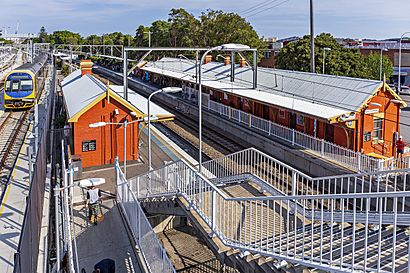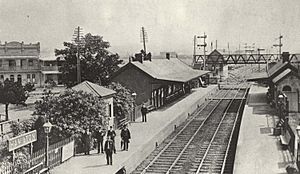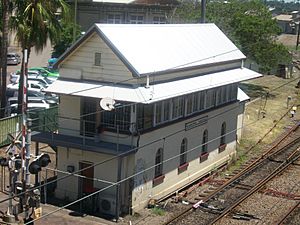Hamilton railway station, New South Wales facts for kids
Quick facts for kids
Hamilton
|
|||||||||||||||
|---|---|---|---|---|---|---|---|---|---|---|---|---|---|---|---|

Station looking east over Platform 2 in October 2018
|
|||||||||||||||
| Location | Beaumont Street, Hamilton, Newcastle, New South Wales Australia |
||||||||||||||
| Coordinates | 32°55′07″S 151°44′55″E / 32.918494°S 151.748555°E | ||||||||||||||
| Owned by | Transport Asset Holding Entity | ||||||||||||||
| Operated by | NSW TrainLink | ||||||||||||||
| Line(s) | Newcastle | ||||||||||||||
| Distance | 164.63 km (102.30 mi) from Central | ||||||||||||||
| Platforms | 2 side | ||||||||||||||
| Tracks | 2 | ||||||||||||||
| Connections | |||||||||||||||
| Construction | |||||||||||||||
| Structure type | Ground | ||||||||||||||
| Disabled access | Yes | ||||||||||||||
| Other information | |||||||||||||||
| Station code | HAM | ||||||||||||||
| History | |||||||||||||||
| Opened | 1872 | ||||||||||||||
| Electrified | Yes | ||||||||||||||
| Traffic | |||||||||||||||
| Passengers (2013) | 1,060 (daily) (Sydney Trains, NSW TrainLink) | ||||||||||||||
| Rank | 155 | ||||||||||||||
| Services | |||||||||||||||
|
|||||||||||||||
Hamilton railway station is a special train station in Hamilton, a suburb of Newcastle, Australia. It is on the Newcastle line. This station is very old and important, so it is listed on the New South Wales State Heritage Register. This means it is protected because of its history.
On January 5, 2015, Hamilton became the temporary end point for some train services. This happened after part of the Newcastle line closed. It stayed this way until Newcastle Interchange opened on October 15, 2017.
Contents
History of Hamilton Station
The main train line connecting Sydney and Newcastle was built in two parts. For a while, these two parts worked as separate railway systems. The line from Sydney to the Hawkesbury River opened in 1887. The line from Newcastle to the Hawkesbury River opened in 1888.
The whole line between Sydney and Newcastle was finished in 1889. This happened when a huge rail bridge over the Hawkesbury River was built.
Early Railways in Newcastle
Hamilton station is on the Northern line, between Broadmeadow and Newcastle. In 1857, the first railway in the Newcastle area opened. It went from Honeysuckle Point to East Maitland. These places were not close to sea ports. This was a problem because railways were built to move goods to ships.
By 1858, the Newcastle line reached the sea port. The East Maitland line was extended into the town of Maitland. By the 1870s, the Great Northern Railway (GNR) went even further. It reached up the Hunter Valley to Murrurundi. At first, only single tracks were laid. But by the 1860s, most lines had two tracks.
Hamilton Railway Station first opened in 1872. It was built between Newcastle and Waratah.
Hamilton Junction and Depot
In January 1888, a new line was built from Hamilton south to the Hawkesbury River. The spot where the GNR line met this new line was called Hamilton Junction. A special building called a signal box was built there in 1888. It was replaced by a new brick signal box in 1898.
In 1892, a place for fixing trains, called a locomotive depot, was built. It was in a triangle of land formed by the train lines. This depot replaced an older one at Honeysuckle Point. The Hamilton depot was later replaced by a much bigger one at Broadmeadow Locomotive Depot in 1924.
At Hamilton, two platforms were built for trains. One was for trains going "Up" (towards Sydney) and one for trains going "Down" (away from Sydney). A goods yard, where cargo was loaded and unloaded, was also built. Several brick station buildings were put on each platform.
Station Features and Upgrades
At the Sydney end of the platforms, Beaumont Street crossed the train tracks. A footbridge was built next to Beaumont Street. This bridge let people cross the tracks safely. People could also cross at the Beaumont Street level crossing. But when a train was coming, the gates closed. Then, people used the footbridge.
The Hamilton Junction signal box controlled the main lines and the level crossing gates. It also controlled access to other railway areas. Until 1924, it also managed trains entering and leaving the Hamilton locomotive depot.
Between the 1890s and 1970s, many railway stations had beautiful gardens. There were even competitions for the best gardens. Hamilton Station had a small plant nursery.
The main train line between Gosford and Newcastle got electricity in May 1984. This was an extension of the electric line from Sydney to Gosford. This project meant new or rebuilt platforms, station buildings, and bridges. Hamilton station also got upgrades.
The original footbridge was replaced in 1976. Some station buildings were updated, but the main brick buildings are still there. The goods sidings, where cargo trains used to park, have been removed. The signal box still controls the main lines and the Beaumont Street level crossing.
In 2007, Platform 1 was made longer. This allowed longer trains to stop without blocking Beaumont Street. In 2015, Platform 2 was also extended. New tracks for storing trains are being laid behind Platform 2.
Train Services at Hamilton
Hamilton station has two platforms, one for each direction. It is served by NSW TrainLink trains.
Central Coast & Newcastle Line
- Trains go to and from Sydney Central.
Hunter Line
- Trains go to and from Maitland, Muswellbrook, Scone, Telarah, and Dungog.
| Platform | Line | Stopping pattern | Notes |
| 1 |
NSW TrainLink
|
Services to Wyong, Gosford & Sydney Central | |
|---|---|---|---|
|
NSW TrainLink
|
Services to Maitland, Telarah, Dungog, Muswellbrook & Scone | ||
| 2 |
NSW TrainLink
|
services to Newcastle | |
|
NSW TrainLink
|
services to Newcastle |
Buses also serve Hamilton Station. These are operated by Newcastle Transport.
What Hamilton Station Looks Like
Hamilton station is a heritage-listed site. This means its old buildings and features are protected. The station has two platforms, each with a building. There's also a signal box, a level crossing, and a footbridge.
Station Buildings
- Platform 1 Building: This building was likely built around 1875 and changed in 1898. It is made of brick with a corrugated iron roof. It has an awning that provides shelter. You can see old timber decorations on the ends of the roof. Inside, some original features like wooden walls remain.
- Platform 2 Building and Toilets: This building was built in 1898. It looks very similar to the Platform 1 building. It also has a corrugated iron roof and brick walls. A small brick toilet block is attached to its eastern end.
- Other Toilets: There is another small brick toilet block at the eastern end of Platform 1. It has a tiled floor.
- Store Room: A small brick store room is located near the Platform 1 building. It has a hipped roof and was likely built around 1898.
Signal Box
The Hamilton Junction signal box is a two-story brick building. It was built in 1898. It has special windows that slide open. This building is very important for controlling trains. It used to control many lines and sidings. Today, it controls the main lines, the Beaumont Street level crossing, and access to tracks for maintenance vehicles.
Platforms and Crossings
The platforms themselves have modern concrete edges and asphalt surfaces. The ends of the platforms have nice garden beds.
The Beaumont Street level crossing is a key part of the station. It has old boom gates from the United States that still work. The signal box controls these gates.
The original steel footbridge was replaced in 1976. This new bridge helps people cross the tracks safely.
Moveable Items
Inside the signal box, there are many old and important items. These include old telephones, a wall clock with the State Rail logo, and alarm bells. There is also a framed map showing the signalling system from 1940. All these items help the signal box work.
Station Gardens
There are many old trees around the station, especially on the southern side of Platform 1. These include Camphor Laurels, palms, and eucalyptus trees. They make the station look very nice.
Hamilton Junction Signal Box
The Hamilton Junction Signal Box is separated from the station by Beaumont Street. This Victorian-era signal box was built in 1897. It is one of the oldest working mechanical signal boxes in Australia. It is also one of the busiest. It has a special lever frame with 56 levers. These levers help control the train signals and tracks.
This signal box used to control many more train lines and sidings. After some changes in the 1980s and 1990s, it now controls Hamilton Junction. It also controls the Beaumont Street level crossing and access to tracks for storing maintenance vehicles.
Why Hamilton Station is Special (Heritage Listing)
Hamilton Railway Station is very important because it is part of a larger railway area. This area was once one of the most important railway junctions in New South Wales.
Historical Importance
- The station opened in 1873. It is linked to the Great Northern Railway, which was one of Australia's first train lines.
- The railway helped the town of Hamilton grow quickly.
- Hamilton station was a key junction where the Great Northern Railway met another important line.
- It was also linked to the Hamilton locomotive depot, a place for train repairs, from 1892 to 1924.
- The Hamilton Junction signal box is very old and has been used for over 110 years. It still has many of its original parts.
Design and Technical Importance
- The station buildings are good examples of late 19th-century railway architecture. They are still mostly in their original condition.
- The station, signal box, and level crossing work together. They show what a busy railway junction looked like a long time ago.
- The signal box is a great example of an old "Standard Signal Box" design. It is in a very noticeable spot in Hamilton.
- It is also important because it is still a working example of old railway technology. It has a large mechanical lever frame that controls signals and tracks.
Community and Research Importance
- The station helps people feel connected to their local history.
- The signal box is important for research. It is still in its original condition and shows how railway signalling worked in the late 1800s.
Rarity
- Hamilton Railway Station is rare because it is a very complete example of an old railway junction.
- The Hamilton Junction signal box is especially rare. Many old signal boxes have been removed or replaced. This one is still working and uses its original mechanical lever system. It is one of the few left in a busy area.
Hamilton railway station was added to the New South Wales State Heritage Register on April 2, 1999.
 | Aaron Henry |
 | T. R. M. Howard |
 | Jesse Jackson |



